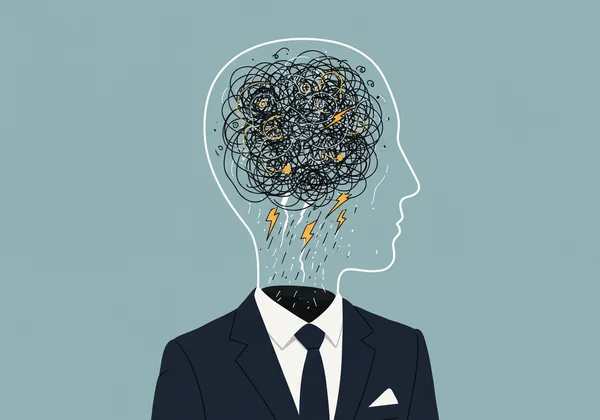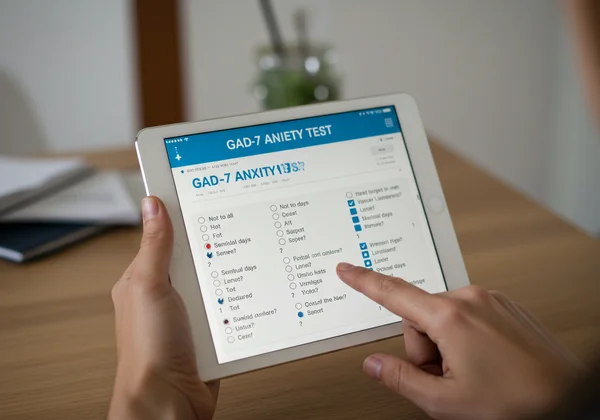高功能焦慮測試:8 個跡象顯示您該檢視自身症狀
August 26, 2025 | By Isla Caldwell
外表上,您是成功的典範:工作表現出色、準時完成每個期限,並維持著活躍的社交生活。但在表面之下,持續不斷的憂慮讓您對每個決定都過度思考,並害怕任何潛在的失敗。您可能會將其歸咎於壓力,但如果情況更嚴重呢?這種經歷通常被描述為 高功能焦慮 ,而辨識其細微的跡象,是尋回內心平靜的第一步。最可靠的釐清方式,是進行一項 高功能焦慮測試 。
儘管「高功能焦慮」並非 DSM-5 中的正式臨床診斷,但此術語有力地描述了一種外在看似能有效應對,內心卻承受著顯著焦慮的狀態。對許多人而言,焦慮是驅動而非阻礙——它能激發抱負,但代價卻是持續的緊繃感。了解這種模式是否適用於您,對於在內在壓力導致倦怠之前加以管理至關重要。

您可能忽略的 8 個高功能焦慮特徵
高功能焦慮的特徵常偽裝成積極的特質,例如強烈的工作道德或縝密的規劃。然而,當這些行為是由恐懼和擔憂所驅動時,它們會對您的心理健康造成重大影響。以下是您可能忽略的八個常見跡象。
1. 完美主義與害怕失敗
極高的標準。 對於高功能焦慮的人來說,「夠好」從來都不夠。您為自己設定了嚴苛的標準,也常常為他人設定。這不僅僅是追求卓越;它源於一種根深蒂固的恐懼,害怕任何不完美都會導致災難或評判。您可能會花數小時為報告中的一個小細節而斟酌,或在腦海中反覆回放一個小錯誤好幾天。這種對失敗的恐懼會讓人癱瘓,使您難以開始新專案或冒險。
2. 不斷的過度思考和思緒反覆
心靈的倉鼠跑輪。 您的思緒是否曾感覺像一個開啟了過多分頁的瀏覽器?這是高功能焦慮的典型跡象。過度思考,或稱思緒反覆,是指陷入負面思緒的循環中。您可能會分析過去的對話,擔心未來的「萬一」,或為最簡單的情況預設詳細的最壞情況。這種心智的攪動令人筋疲力盡,幾乎不可能讓您活在當下並享受時刻。您身體在此,但思緒卻遠在千里之外,忙著試圖解決尚未存在的問題。
3. 拖延與隨之而來的衝刺式工作
逃避然後恐慌的循環。 這看似矛盾,但拖延是焦慮的常見伴隨因素。害怕無法完美完成任務的恐懼可能如此強烈,以至於您完全避免開始。您可能會用不那麼重要的事務填滿時間,而主要的截止日期卻迫在眉睫。然後,當壓力變得無法承受時,焦慮驅動的腎上腺素會湧現,您會以一種瘋狂、高強度的衝刺方式完成任務。儘管您最終可能成功,但這種逃避和恐慌的循環是一種壓力大且不可持續的運作方式。
4. 思緒的躁動不安與無法放鬆
無法關閉。 即使您應該休息時,您的身心仍然處於高度戒備狀態。您可能會發現無法坐下來看完一部電影而不查看手機,或者您可能會感到一種持續不斷、揮之不去的內疚感,覺得自己「應該」做些有成效的事情。這種內在的躁動不安也會以身體形式表現出來——坐立不安、抖腿,或是一種普遍的緊張感。真正的放鬆對您來說感到陌生,因為您的神經系統始終處於戰鬥或逃跑模式。當您 檢查您的焦慮分數 時,獲得症狀的基準線可以幫助量化這種感覺。

5. 您歸因於壓力的身體症狀
憂慮對身體造成的損害。 高功能焦慮不僅僅存在於您的腦海中;它也存在於您的身體裡。您可能會經歷慢性身體症狀,而您將其歸因於忙碌的生活方式或簡單的壓力。這些症狀可能包括持續的肌肉緊張(特別是頸部和肩膀)、頻繁的頭痛、胃痛或腸躁症等消化問題,以及不明原因的疲勞。您的身體記錄了持續的憂慮,而這些身體跡象是它發出訊號,表示承受了過多的壓力。
6. 不斷尋求他人的認可
尋求認可的需求。 儘管您外表自信,但內心可能私下與強烈的自我懷疑搏鬥。這導致了對外部認可的需求。您可能會反覆詢問老闆您的工作是否良好,向伴侶確認他們是否沒有生氣,或者多次發訊息給朋友以確認計畫。這並非為了尋求讚美;而是為了平息腦中那個堅持您做錯了事的焦慮聲音。您依賴他人的認可來感到安全,即使只是暫時的。
7. 過度承諾與取悅他人的傾向
取悅他人的病症。 說「不」幾乎感覺不可能。您可能會在工作和個人生活中過度承諾,因為您害怕讓他人失望或被視為無能。這種取悅他人的傾向源於一種焦慮驅動的被喜歡和被重視的需求。您最終會排滿行程,卻幾乎沒有自己的時間,導致倦怠和怨恨。您的自身需求總是退居次位,讓位於周圍每個人的感知需求。
8. 與他人進行負面比較
比較的陷阱。 您的內心獨白常常包含著對自己與他人相比表現如何的持續評論——而您幾乎總是覺得自己有所不足。您瀏覽社群媒體,看到同事的升職或朋友的完美假期,便會感到一股不足感。這種負面比較助長了您的焦慮,強化了您不夠好、必須更加努力才能跟上的信念。它創造了一個惡性循環,使您的成就難以帶來持久的滿足感。如果這些比較正在影響您的日常生活,或許是時候進行 免費的 GAD-7 測試 了。
進行高功能焦慮測試以獲得釐清
在上述跡象中認出自己,既可能是一種解脫,也可能是一種擔憂。關鍵的下一步是從主觀感受轉向客觀理解。這正是科學驗證的篩查工具能發揮關鍵作用。我們提供的高功能焦慮測試基於 GAD-7(廣泛性焦慮症-7)量表,這是一個醫護專業人員信賴的工具。

區分模式與疾病
雖然「高功能焦慮」描述的是一種行為模式,但其症狀往往與廣泛性焦慮症(GAD)等臨床焦慮症狀顯著重疊。GAD-7 旨在衡量常見焦慮症狀的嚴重程度,例如感到緊張、無法停止擔憂以及煩躁。透過回答幾個簡單問題,您可以獲得一個分數,幫助您了解您的症狀屬於輕度到重度焦慮的哪個區間。這不是診斷,但它是有力的數據。
檢視您的焦慮分數的第一步
在我們的平台上進行 保密的 GAD-7 焦慮測試 既簡單又快速,且完全匿名。在不到三分鐘的時間內,您將立即收到焦慮分數和初步解讀。這個分數提供了一個具體的起點。它幫助您以新的角度看待自己的經歷——不是個人失敗,而是一個可應對的可衡量模式。對於那些希望深入了解的人,我們提供獨特的、由 AI 驅動的分析,為您的挑戰、優勢和可行的下一步提供個性化見解。準備好了解您的分數了嗎? 在這裡進行免費的高功能焦慮測試。
從覺察到行動
認識到高功能焦慮的跡象是一種勇敢而有力的自我覺察行為。這意味著承認推動您成功的引擎可能也運轉過熱,可能導致倦怠。您不必生活在持續、潛在的憂慮之中。理解是管理焦慮的第一步,讓您能夠真正地茁壯成長,而不僅僅是在壓力下生存。

如果這些跡象讓您深有同感,那麼您並不孤單。通往更平靜心靈的旅程始於一個單一、明智的步驟。別再讓不確定性阻礙您了。立即 邁出第一步 ,進行我們免費、保密的焦慮測試,以獲得您應得的清晰和洞察。
關於高功能焦慮的常見問答
我是焦慮還是壓力大?
壓力通常是對特定外部觸發因素(例如工作截止日期)的反應,一旦觸發因素消失,壓力亦會隨之消退。另一方面,焦慮則更具內在性且持續存在。即使在沒有明顯壓力源的情況下,它也可能持續存在,其特徵是過度擔憂未來。如果您的壓迫感是持續不斷的,並且在壓力事件結束後仍未消失,那麼它可能更傾向於焦慮。我們的 焦慮或壓力測試 可以幫助您看出哪種模式更為主要。
線上焦慮測試的準確性如何?
線上焦慮測試的準確性完全取決於其科學基礎。許多「測驗」僅供娛樂,但基於臨床驗證量表(如 GAD-7)的工具則是可靠的篩檢工具。雖然它不能取代專業診斷,但我們的測試提供了您當前症狀嚴重程度的高度可信的快照,與全球臨床環境中使用的情況相同。它是自我評估的一個出色且值得信賴的第一步。
什麼是 GAD-7 焦慮測試?
GAD-7 是一種由醫生開發的七個問題篩檢工具,用於衡量廣泛性焦慮症的嚴重程度。它要求您評估在過去兩週內,您被諸如無法控制的擔憂或感到害怕等症狀困擾的頻率。每個答案都有一個分數值,總分有助於指示一個人的焦慮是輕微、輕度、中度還是重度。它因其簡潔性、可靠性和在臨床實踐及研究中的效度而受到推崇。
免責聲明 : 本文僅供參考,不構成醫學建議。我們的測試是篩檢工具,而非診斷工具。如有任何健康疑慮或在做出任何與您的健康相關的決定之前,請諮詢合格的醫護專業人員。